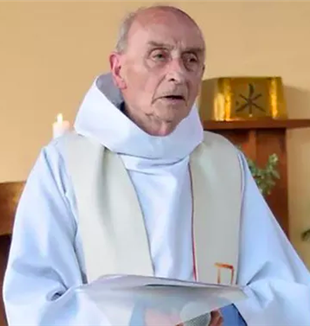
Fr. Hamel's Death and the Mercy of God
In my prayer over the last weeks, I have returned over and over to the life and death of Father Jacques Hamel in France. Every time I found myself thinking about him, I wasn’t really sure why...In my prayer over the last weeks, I have returned over and over to the life and death of Father Jacques Hamel in France. Every time I found myself thinking about him, I wasn’t really sure why. There was something about his story, the way people spoke about him, and the way he died that drew me to know more. I also had a number of encounters since Fr. Hamel died that kept bringing me back to him. People I spoke to often lamented his death and said things like, “Humanity is just so evil, isn’t it?” I found these phrases at odds with my experience, but I couldn’t explain or put anything into words at the time.
In the wake of what seems like completely senseless violence, I am prone, like the people I quoted above, to despair. I forget my experiences of God’s mercy in my own life and in the lives of those around me and I become anxious about many things (I’m prone to anxiety, anyway, it is worth noting). What can be done in the face of reckless hatred? What should our response be when we are confronted by death? I carried these questions into the week as I dug into the reading for School of Community (page 26-32 of the Fraternity Exercises). I also read this article, which contains the homily given at the funeral of Father Hamel by his Archbishop, Dominique Lebrun. I found it a particularly moving read in general, and parts of it seemed very relevant to Fr. Carron’s reflections. In the combination of these texts, I found the beginnings of an answer to the questions that have been captivating me.
First, I noted the Archbishop’s reflection on Fr. Hamel’s final words: “Begone Satan.” Some of the secular people I had been speaking with about Fr. Hamel stated openly that these words distressed them. I paraphrase: “This poor old man was duped by religion. In his dying moment he couldn’t see the reality of who was attacking him and blamed a fictitious devil.” Again, I had no response to them at the time. But the Archbishop said, almost in reply: “Evil is a mystery. It culminates in horrific moments that take us beyond what is human. Is this not that what you meant, Jacques, with your last words? You fell to the ground after the first stab; you tried to push your attacker with your feet, and you said, ‘Go away, Satan.’ Again you said, ‘Begone, Satan.’ In this you expressed your faith in humanity, created good, but gripped by the devil.” "In this you expressed your faith in humanity." It seems to me Fr. Jacques saw in his attackers fellow human beings twisted by evil and he reached out to save them at the last moment. He prayed aloud and appealed to their common created humanity; a humanity skewed out of its truth, but nonetheless imbued with the Incarnation. In those two words he said to his attackers, “We have the same heart. Be free from this evil that grips you!” I remember that even Jesus said these same words to Peter, his friend, to call him back when he was lost. Faced with physical assault and certain death, Fr. Hamel spoke to his attackers the same words of Christ said to Peter. He was trying to save their lives as much as his own. This led me to another realization.
The two young men in that church, as far as we can tell, said “No,” to Fr. Hamel’s final plea for their lives. But though my own actions are not as evil as theirs, have I not also refused God in my life? Archbishop Lebrun addressed this as well: “It is in our heart, in the depths of our heart that we have to say ‘yes’ or ‘no’ to Jesus, ‘yes’ or ‘no’ to the path of truth and peace; ‘Yes’ or ‘no’ to the victory of love over hatred, ‘yes’ or ‘no’ to his resurrection. The death of Jacques Hamel called me to make a frank ‘yes,’— no, not a tepid yes — a ‘yes’ to life, as the ‘yes’ of Jacques to his ordination. And we must respond yes again and again. God will never force us. God is patient, and God is merciful. Even when I, Dominique, have resisted, and said ‘no’ to love; even when I told God, ‘I will think about it; we will see later,’ even when I have forgotten, God is patient. God expects me because of his infinite mercy.” Benedict XVI echoed this on pg. 29 of our School of Community: “With every human ‘no’ a new dimension of His love is bestowed and He finds a new and greater way to bring about His ‘yes’ to man, history, and creation.” The Archbishop, Pope Benedict, Fr. Hamel’s attackers, and I all have something in common: We have said ‘no’ to God. But Fr. Hamel is calling out to each of us. He is appealing to our created humanity to bring about a new and greater “yes”.
God expects us because of His infinite mercy. I know that Fr. Hamel’s death has already been efficacious because I can witness the change in myself, as his own Archbishop said. What a mercy that the life and words of an 86 year old priest in France, killed by hatred and a “no” to God’s love, can move even my stubborn heart to say “yes” to Him again.